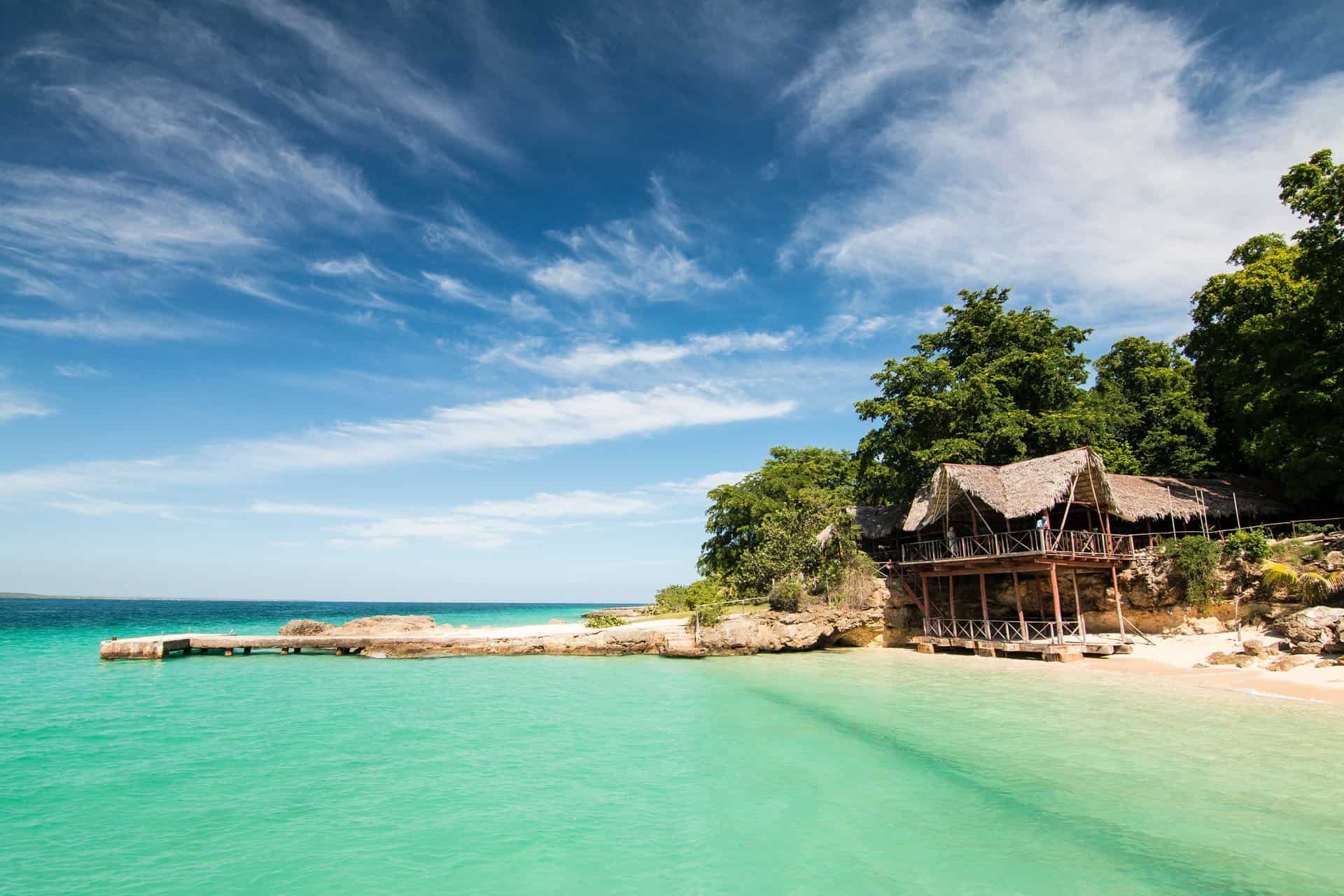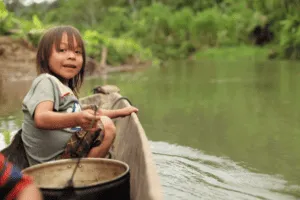
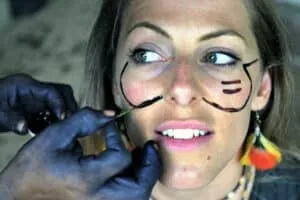
We met Zoe Tryon, founder of One Of The Tribe, to discuss the relationships she has formed with remote Amazonian tribes & her commitment to protecting the rainforest.
Guided by the understanding that we are all part of one human tribe, Zoe set up a non-profit to fund & support tribe-driven initiatives all over the world, including healthcare, education & economic capacity-building projects. Zoe’s words & actions are inspiring & she ignites a sense of hope for a better future for endangered indigenous communities.
From her first night sleeping out in the jungle to taking part in Andean cleansing ceremonies & embarking on an epic journey by canoe in search of a Jesuit missionary, Zoe shares a fascinating insight into her life in the Ecuadorian Amazon, as well as the greatest pressures that indigenous communities are facing today…
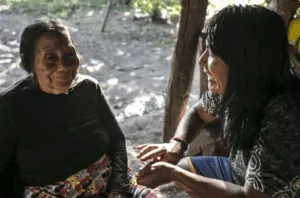
What first drew you to Ecuador &, specifically, to the Amazon?
Ever since I was a little girl, when we studied the Amazon in Geography class, I was immediately intrigued & inspired by its almost mystical nature. I dreamed of visiting one day ever since then, but I didn’t know anyone who had been to the Amazon & I wasn’t particularly adventurous, so it remained a dream for about twenty years until the calling became so strong. I really wanted to go & learn from the forest & indigenous peoples, & from that standpoint, then work out how best I could support the Rainforest. So when the opportunity to go presented itself it was a huge YES immediately. I even had to leave my job to go, but I knew this was my chance and I might not get another one – I was just determined to go to the Amazon & it was by chance it happened to be Ecuador that I was invited to.
Do you remember your first night in the jungle? Were you instantly enchanted, or a little overwhelmed?
Absolutely, & I was instantly enchanted. Everything felt so utterly alien, like nothing I had ever experienced before; the scents, the humidity, the sounds of the forest. But I also felt a strange feeling of homecoming after dreaming about it for so long. I was sleeping on a wooden floor on a yoga mat with a mosquito net which kept out the mozzies & vampire bats & I remember lying there listening to the symphony of the forest at night, which is actually incredibly loud, & just thinking I was the luckiest girl in the world to be there. I was so excited I could barely sleep! And then once I did fall asleep I was woken at 4 am to drink guayusa tea which is an Achuar tradition, to drink tea and discuss your dreams at 4am to decide what to do that day!
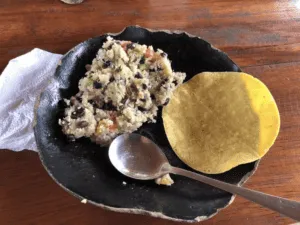
What has been your biggest lesson in building relationships between apparently wildly divergent cultures?
To remember that I know nothing – I really try to keep open & curious and remember that what is ‘normal’ to me is often just a cultural construct. I think people can sense if you are genuinely interested in & respectful of them, even if you don’t speak the same language. I think also having a sense of humour & being able to make people laugh is a great bridge builder. I have found that slapstick comedy has saved the day in quite a few potentially sticky situation
We heard about an epic journey you undertook to visit a missionary – tell us more!
Ah that was a fun adventure to meet Padre Louis Bola, a great hero of mine. I am not a big fan of missionaries generally, as they often work with the oil companies & don’t have the best interests of the indigenous people at heart. But this man, a Jesuit, was an absolute hero. He walked into Achuar territory to teach peace when they were constantly at war, he was incredibly brave & humble, learned the language & the customs of the people & became one of them. His work unifying & pacifying the Achuar in Ecuador is what probably has given them the collective strength to resist oil development in their ancestral lands until now.Once he’d done that he set off into Peru, which is where I journeyed by canoe for two weeks to try to meet him. We were a motley crew in an uncovered canoe, three Achuar people, an Ecuadorian, two American shrinks studying war & peace, & me. We travelled down into Peru past offshore oil towns which are pretty dodgy as you can imagine, past strange missions like something out of a movie, then back up the charmingly titled – ‘river of fear’, through the territory of other indigenous tribes, who until recently were known to kill all interlopers but keep any women & breed with them!
We camped at night on the banks of the river but had battles with snakes, ants & spiders. It is a long story, but finally, we met people along the river who told us stories of Padre Bola & so his legend of kindness, humour & love of the indigenous peoples grew as we journeyed. We had to abandon our big canoe & move into smaller canoes as the low river narrowed, often having to get out of it and push, in the dark, in piranha-infested waters! But we finally arrived at the village where he was living & what an incredible human being he was; so full of life and love & constantly on the move…at 78 years old he could walk through the forest as fast as any Achuar, quick to laugh & passionate about the people whom he lived with and a great activist. I try not to have regrets in life but one that niggles at me is that I didn’t accept his offer to stay & live with him for 6 months to learn from him, to speak Achuar & learn from all his experience as a jungle activist. There was no communication with the outside world & I was worried that my family would worry! Sadly he died a couple of years later. But he will be forever remembered & loved by so many.
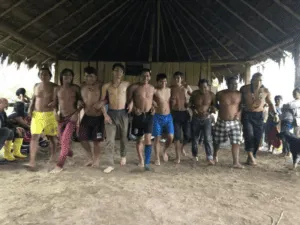
What is the most unusual ritual you have observed or participated in?
Well, everything is unusual until it becomes usual. So the first time I participated in many rituals I was wowed. I think as a previously prudish British girl, the nudity involved in the Andean cleansing ceremonies was challenging for me initially! It is also very cold high in the Andes & they are often held in a cold cattle stable. I remember the first time being freezing standing on a floor all sticky with what I found out was cologne & spirits, which get spat upon you mixed with herbs, I kept thinking someone would jump out & say ‘You are on candid camera!’ But it was very serious. I stood surrounded by ancient volcanos & the shaman used the power of the mountains, huge rocks you have to hold to your heart, spears, & herbs, to cleanse you, then just as you think it can’t get worse they beat you with stinging nettles, & blow fire all over you. But I have to say in the end I felt utterly incredible & now I do them regularly. I have actually never been sick in the jungle & I think it is because I go & have a cleansing, empowering Andean shaman ceremony before I go into the jungle for an extended period.
What do you never travel without?
Camera, garlic pills, journal.
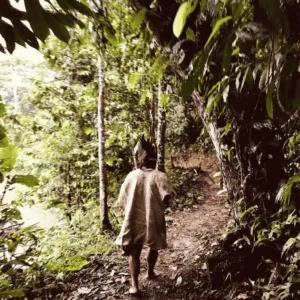
You have spent a lot of time with the Achuar & Sapara communities. How do their cultures compare?
They are both dream cultures, so they are guided by visions & dreams, but the Achuar were traditionally more warlike & have never been conquered. The Sapara has always been peaceful & sadly due to living nearer to the edge of the forest have had more experience with colonisation & therefore a great deal of trauma, beginning with the rubber tappers, gold miners & now oil mining, so they have a different multigenerational experience and outlook upon the world. The Sapara are very conscious of their mortality as a people, indeed many friends are sharing their ancestral wisdom before they die out. Many of the elders are dying off & only four people still speak Sapara. So when you visit Sapara territory there is incredible generosity as those who have wisdom share it with us & other members of the community, young Sapara returning to their country, as many have had broken lineages. Whereas the Achuar have never been conquered & had much less to do with the outside world, they have a cultural pride that is also beautiful & passed down for many generations. I love visiting both cultures who also share a great love & understanding for their forest homes.
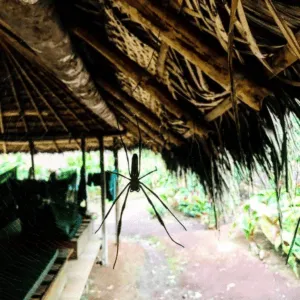
Can you explain a little about the pressures that these, and many such communities, are under from big oil and deforestation?
Unfortunately in some of the most pristine, biodiverse places on earth there are also suspected to be great oil reserves & due to our insatiable desire for energy, our culture pushes deeper & deeper into these precious lands in search of oil and other minerals, gold etc. Sadly, once the oil access roads or pipelines go in, that provides access for further deforestation and colonisation. Indigenous peoples are meant to give ‘free, prior & informed consent’ before mining is done in their territory, but cash-strapped nations overlook this & sell oil blocks deep in the forest to the highest bidders. Nowadays indigenous peoples in the Ecuadorian Amazon are well educated as to the impact of oil development upon their lands & culture & are pretty much united against it. I took a group of leaders from the South Central Ecuadorian Amazon on a ‘toxi-tour’ of the Northern Amazon to meet indigenous leaders there and to see with their own eyes the impacts of the contamination caused by ChevronTexaco and it was heartbreaking for them to witness but reminded them of what they are fighting for. Obviously, these people have to have incredible vision & courage as the government is against them, wealthy oil companies backed by the army are trying to get into their lands & the indigenous people have few resources financially to fight. Despite death threats, beatings & so much more they continue to show up & fight for their children and grandchildren. An elder once said to me ‘Zoe even millionaires in your culture need clean air to breathe & fresh water so we are fighting for their children & grandchildren too’ – that level of generosity was incredibly humbling to me.
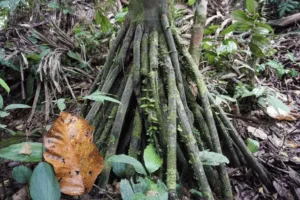
What can a client expect to learn and achieve with a week with you in the Amazon?
I hope that everyone will have an incredibly fun adventure but also an experience of returning to nature. Being with the indigenous people being involved in their way of life, & being so deep in the forest with no tech, you can’t help but re-examine your life & place in the world. We always have some great existential discussions whilst chilling in the river at sunset! People often say to me that it is when they return to their ‘normal’ lives that the impact of the trip becomes really apparent to them as they see their life with a new vision. So my trips are fun but you also can’t help but experience some kind of transformation as the forest, the Andes & the people who are still connected to nature just have that effect on everyone.
The scale of the issues the Amazon is facing seems incredibly daunting to take on. How hopeful are you for the future of these environments & their communities?
I think we have to keep hopeful to keep moving forward, if we lose hope all is lost. It is incredibly daunting but to me, there is no other option than to keep on working to protect the forest & her people and to keep on hoping. Once you have visited the forest it is hard not to fall completely in love with it. The forest has become a part of me & I of it, personally I have committed to my indigenous friends that I will stand with them, committed to helping in any way I can for the rest of my life.
BECOME ONE OF THE TRIBE Follow Zoe on Instagram
Related Stories
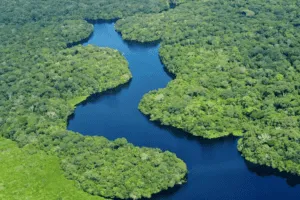
Best Time to Visit the Amazon | Your Questions Answered
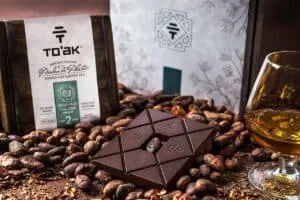
To’ak | Sacred Chocolate from the Ecuadorian Andes
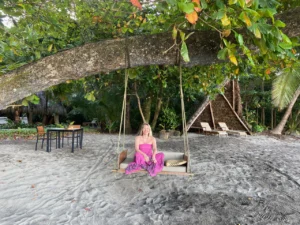
Juliet Kinsman on Sustainable Travel
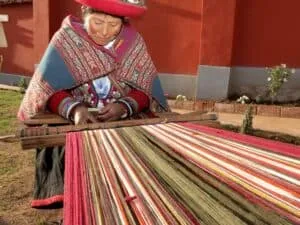
Community in Latin America | Broaden Your Horizons
@plansouthamerica
